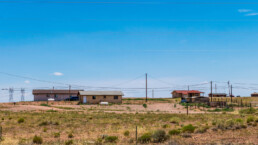by Ray Levy Uyeda, Prism
There are energy eventualities we know for certain. Coal production has been in decline for decades. Mines have been stripped of their underground deposits, meaning there’s simply less coal to dig out. Natural gas, long deemed coal’s competitor, is cheaper to produce. We know that one potential solution for climate change is wind- and solar-generated electric power that doesn’t require the extraction and burning of fossil fuels. We also know the transition away from fossil fuels is needed to avert further global climate crises—and it’s inevitable, as suppliers and consumers lean toward carbon-neutral solutions.
Advocates also argue that what’s needed is an equitable and Just Transition for communities and workers impacted by and dependent on fossil fuel-based jobs, like coal-power energy production.

Community advocates in Arizona and residents of the Navajo Nation have just a few months remaining to convince the state’s energy regulatory body, the Arizona Corporation Commission (ACC), to ensure that a utility rate increase includes funds for a Just Transition. Residents of the Navajo Nation, led by a coalition of Diné and other Indigenous-led organizations, say that Tucson Electric Power (TEP), the company petitioning the ACC for a rate increase, has no plan to provide coal-impacted communities with jobs, supportive services, funding, or environmental accountability despite relying on the community’s labor and land for decades.
Recent Posts
‘Unconstitutional. Unethical. Authoritarian.’ ICE Bars Millions Of Immigrants From Bond Hearings
July 18, 2025
Take Action Now One watchdog said the new policy “seems like a blatant attempt to stop them from exercising their right to due process.”……
Americans Are Not Nearly Alarmed Enough About Climate Change
July 18, 2025
Take Action Now Americans still don’t comprehend how imminent, dangerous, and far-reaching the threat is—and journalists are partly to blame.By…
The IRS Is Building A Vast System To Share Millions Of Taxpayers’ Data With ICE
July 17, 2025
Take Action Now ProPublica has obtained the blueprint for the Trump administration’s unprecedented plan to turn over IRS records to Homeland Security…
Israel’s Sudden Assault On Syria Is Unchecked Aggression
July 17, 2025
Take Action Now Jerusalem is bombing Damascus and threatening al-Sharaa’s rule, while Washington was hoping to help the nascent government on…




